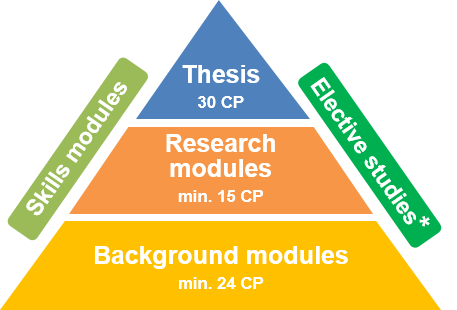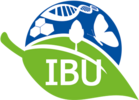M.Sc. Biology

Contact information
Bifak. Academic Commission Fak. V & VI
Student association
Curriculum
Programme Structure and Module Types
The four semester Biology / Biologie master programme no longer has mandatory courses. Each student creates an individual study plan from the modules offered in the program. In order to further support individual interests, inclinations, career aspirations, and profile development, students are able to choose 30 of the 120 total credit points (CP) in the degree programme from other universities within Germany and abroad Elective Studies*. The course of studies concludes with the Master Thesis Module (30 CP).
Students can begin the programme in either the Summer or Winter semester. However, due to the broad range of Background Modules offered in the programme, beginning the course in the Winter semester is recommended.
The elective curriculum in the M.Sc. Biology programme combines three module types with different objectives.
Background Modules (min. 24 CP)
Background Modules convey general knowledge on biological topics. Modules take place in 3-7 week blocks (between 6 and 15 CP) and usually consist of a lecture, seminar, and internship with 8-20 participating students.
Skills Modules
Skills Modules (6 or 3 CP) serve to support the development of practical skills and take place in courses with up to 24 students. Topics include various biological working techniques, academic English, and bioethics.
Research Modules (min. 15 CP) und Master Thesis Module (30 CP)
Research Modules consist of individual research projects which, depending on students’ choice of supervisor, take place in either a working group at the University of Oldenburg or in an external research organization. During the research project, students work with a specific research question for 6-7 weeks (15 CP). The individual nature of this module allows students to practice independent academic work, including experimental techniques, working with academic literature, and presenting results. This module prepares students to begin the Master Thesis Module (30 CP) at the conclusion of their studies which includes a substantial research project and a colloquium.
Modules of the Biology Master's Degree Programme
For an overview of courses offered in the Summer and Winter semesters, see the
Below you find detailed information on the contents and methods of instruction in individual modules. Module descriptions can be viewed by clicking the module title in the following tables of modules. Completed module handbooks for direct download are available here.
Information on the schedule and meetings for courses in the current or previous semesters can be found via the online course catalogue by clicking the module titles.
Background Modules (min. 24 CP)
| bio703 | Basic Concepts in Plant Sciences | Zotz, Albach, von Hagen | 12 CP |
| bio655 | Ornithology in theoretical Concepts | Liedvogel, Bouwhuis, Köppl, Langemann, Mouritsen, Schmaljohann, Feenders | 12 CP |
| bio733 | Evolutionary Population Genetics | Gerlach, Albach, Khan | 6 CP |
| bio736 | Evolutionary Transcriptomics | Nolte, Dennenmoser | 6 CP |
| bio845 | Development & Evolution | Sienknecht, Claußen | 6 CP |
| bio846 | Lab Exercises in Development & Evolution | Sienknecht, Claußen, Ebbers | 6 CP |
| bio605 | Molecular Genetics & Cell Biology | Neidhardt, Koch | 12 CP |
| bio765 | Current Methods in Plant Sciences - Ecology, Phylogeny and Molecular Biology | Albach, Zotz, Will, Khan, von Hagen | 12 CP |
| bio720 | Marine Biodiversity | Martinez Arbizu | 15 CP |
| bio695 | Biochem. Conc. in Signal Transduct. | Koch, Scholten | 12 CP |
| neu210 | Neurosensory Science & Behaviour | Langemann, Mouritsen | 9 CP |
| neu220 | Neurocognition & Psychopharmacology | Thiel, Gießing | 6 CP |
| bio675 | Molecular Ecology | Nolte, Gerlach | 12 CP |
| neu141 | Visual Neuroscience: Physiology & Anatomy | Greschner, Dedek, Janssen-Bienhold, Puller | 12 CP |
| neu150 | Visual Neuroscience: Anatomy | Janssen-Bienhold, Puller | 6 CP |
| bio663 | Ornithology in Practice | Liedvogel, Bouwhuis, Langemann, Vedder, Moiron, Schmaljohann | 12 CP |
| bio773 | Sequence based Biomonitoring | Nolte, Dennenmoser, Martinez, Albach | 12 CP |
| neu360 | Auditory Neuroscience | Köppl | 6 CP |
| neu340 | Invertebrate Neuroscience | Kretzberg | 6 CP |
| psy270 | Functional MRI Data Analysis | Gießing, Thiel | 9 CP |
| neu310 | Psychophysics of Hearing | Beutelmann | 12 CP |
| bio860 | Comparative Developmental Biology | Sienknecht | 6 CP |
| bio770 | Field Methods in Organismal Biology | Zotz, Gerlach, Albach, Nolte, Mouritsen, von Hagen | 15 CP |
| bio780 | Biodiversity of Littoral Communities | Martinez-Arbizu | 15 CP |
Skills Modules
| bio870 | Communicating Biology | Zotz, Laubinger, Albach | 6 CP |
| bio880 | Plant Diversity | Albach, von Hagen, Janzen | 6 CP |
| bio777 | Objekte in wissenschaftl. Sammlungen: Konserv., Management & Forschungsfragen | Will, Ellwanger, Krämer | 6 CP |
| neu790 | Communicating Neuroscience | Kretzberg, Köppl | 3 CP |
| bio890 | Current Topics in Biology* | Gerlach, teaching staff | 3 CP |
| neu730 | Biosciences in the Public Eye and in our Laws | Köppl, Sienknecht | 6 CP |
| neu751 | Laboratory Animal Science | Köppl, Langemann | 3 CP |
| neu760 | Scientific English | Manley, Köppl | 6 CP |
| neu780 | Introduction Data Analysis with Python | Winklhofer | 6 CP |
| neu800 | Introduction to Matlab | Gießing | 3 CP |
| bio783 | Object-based research projects in biological collections | Will, Albach | 6 CP |
| neu810 | International Meeting Contribution | Kretzberg, Köppl | 3 CP |
| neu820 | Neuroscience Journal Club | Mertsch | 3 CP |
Elective Studies (max. 30 CP)
- M.Sc. Landschaftsökologie
- M.Sc. Marine Umweltwissenschaften
- M.Sc. Neuroscience
- M.Sc. Informatik
- M.Sc. Hörtechnik/Audiologie
- M.Sc. Molecular Biomedicine
Further elective courses provide the opportunity to complete courses from other programs at the University of Oldenburg, such as those listed above.
It is possible to complete courses offered by the cooperating universities of Bremen and Groningen (Master of Medicine) or other universities in Germany or abroad. M.Sc. Biology students can complete courses offered at European universities in the ERASMUS+ partnership in Denmark, Finland, Italy, Norway, and Spain (contact person: Thomas Glatzel). Additionally, courses can be completed outside of Europe at James Cook University in Australia. Agreements with partner universities make studying abroad easy and feasible. For more information on studying abroad, contact the International Office. Modules outside of the M.Sc. Biology/ M.Sc. Biologie program should be logically connected to other courses in the study program and must be preapproved by the board of examiners.
Research Modules (min. 15 CP) und Master Thesis Module (30 CP)
| bio810 | External Research Project | Zotz, teaching staff | 15 CP |
| bio900 | Biology Research Module | Zotz, teaching staff | 15 CP |
| mam | Master Thesis Module | teaching staff | 30 CP |
Students in the M.Sc Biology / Biologie program must complete at least 15 CP of Research Modules, i.e. students must complete either bio900 or bio810. Both modules can be completed several times with a different focus. The study program concludes with a Master Thesis Module (30 CP). The same examiner can evaluate no more than 45 CP in the individual Research Modules and Master Thesis Module. bio900 is mandatory in combination with external master thesis.
The project topics in the Research and Master Thesis modules are chosen individually. Research areas are determined by the working groups involved in teaching the program. An overview of the working groups in the biological sciences can be found on the institute’s website under uol.de/ibu/. An initial orientation into concrete research topics is provided in the module bio900.
External research projects (at other universities or research institutes within Germany and abroad) are possible in the module bio810. The master thesis can be supervised, completed and evaluated at an external institution with the approval of the board of examiners.



